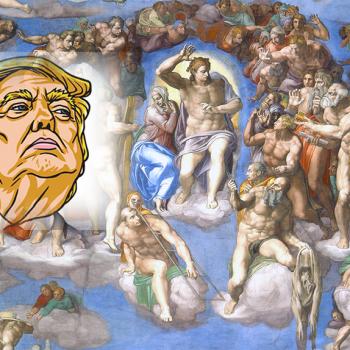Over the past year, I have been watching trust slowly erode between me and another person. We were never close, but had what I thought was mutual respect and goals coupled with an ability to bridge differences in style and methodology.
Bit by bit, the trust links broke. Happened on both sides, I believe, but I can’t be sure. I can only know for sure what I experienced here. And if I am to use this as a learning experience so that I might walk in greater integrity, then it is worth examining carefully.
I made a bundle of mistakes. I assumed understanding when there apparently was none. I didn’t take the time to check things out and make sure we were on the same page. I was a coward when it came to setting up and living with genuine accountability standards. I would take my frustrations with the situation elsewhere rather than dealing with them straightforwardly and with much more honesty. Yes, I made a huge number of mistakes.
Now is where the true wrestling begins, for those are the easy things to admit. For I discovered what looked like a systematic undertaking to by the other party to avoid, betray, undermine, and ultimately destroy, all clothed in niceness and innocent looks and face-to-face agreement with plans and requests.
There’s a part of me that wants to think the whole world is my fault—that if only I would have/could have done things differently, that the outcome would have been more to my pleasing. While this can be seen as misplaced guilt, it is also the ultimate power play. If the world is my fault, then I have the ultimate power over the world and everything in it. But what if others are as autonomous and as responsible (or irresponsible) as I am? What if I really can’t control the actions of others, but only my own? Then what do I do with this betrayal here? No matter how many mistakes I made, there are still the independent actions of another to consider.
It has long been my choice to trust first, to make trust my default position, and leave that place only when overwhelming evidence exists to suggest that I am wrong to continue to trust. I believe this is the proper way to act as a Christian, as one who firmly believes that, no matter how hard it may be to find, that each of us is indelibly marked with the Imago Dei, the Image of God, upon our souls. Leaving behind that foundation to relationships fills me with pain and grief. The loss throws me off balance.
I believe that the basis of the Gospel of Jesus Christ is that God choses to trust us again by virtue of our reconciliation, our reconnection with God. ,made real and possible by the life, death and resurrection of Jesus Christ. God chooses to trust us again, to trust me, Christy, to walk through my life seeking to love God and to love my neighbor, whomever that may be. God trusts that I, Christy, will not betray that powerful calling. And God gets it wrong over and over again. So how does God choose to trust again? Or does sometimes it get to be too much for God after all?
There do seem to be place written about in our Bibles where God appears to just give up and give people over to their own wickedness. So folk just sink deep into their selfishness and their destructive activities they call pleasures and stop trusting and caring about anyone else and then finally discover that since they don’t trust or care about anyone else, no one else trusts or cares for them and finally, finally, will start to turn back to God and say, “help; I’m sorry—please let me come back again.”
And that becomes the hinge-point. That moment of real metanoia, repentance, mind-change that provides a radically new perspective on the situation. When I can finally say, “I have seen this whole thing wrongly. I have wanted only what I wanted, and never taken into account who or what or how I was destroying in my pursuit of my own goals.” That process is called “idolatry” and it is why the Bible is filled with admonitions against it. Idolatry—the old fashioned word for what all of us do day in and day out—worship something, anything besides the Holy God who calls us to the same state of holiness that God exists in.
Idolatry is wonderfully seductive. It’s full of thoughts like: just turn aside for a little while—it will pay off in the long run. Or: This moment of illicit pleasure taken at the expense of another or of your integrity, of power used to kill rather than create, of exposure to the sordid in the name of education will not really hurt anyone.
The practice of idolatry invites us to take the wide and lazy path to destruction, not the narrow and demanding path to become fully human. It invites us to the easy way out, not the hard way in. It invites us to downgrade the holiness and expectations of God to a “well, God is gracious and all is forgiven anyway, so what does it matter?”
I seem now to have wandered a long way from the betrayal and lack of trust that began this post. But I believe that a willingness to betray others only comes when we have decided to betray God and worship something else. Like our own ambitions, our own comfort, our own grievances, our own slights. A rebirth of trust can only come when these things are faced—by all concerned. It will only happen by long, hard looks at ourselves and repentance that doesn’t give us wiggle room but makes us face the actions with honesty and courage.
Hardly anyone gets there, in my opinion.
Hope I’ll be different.
















